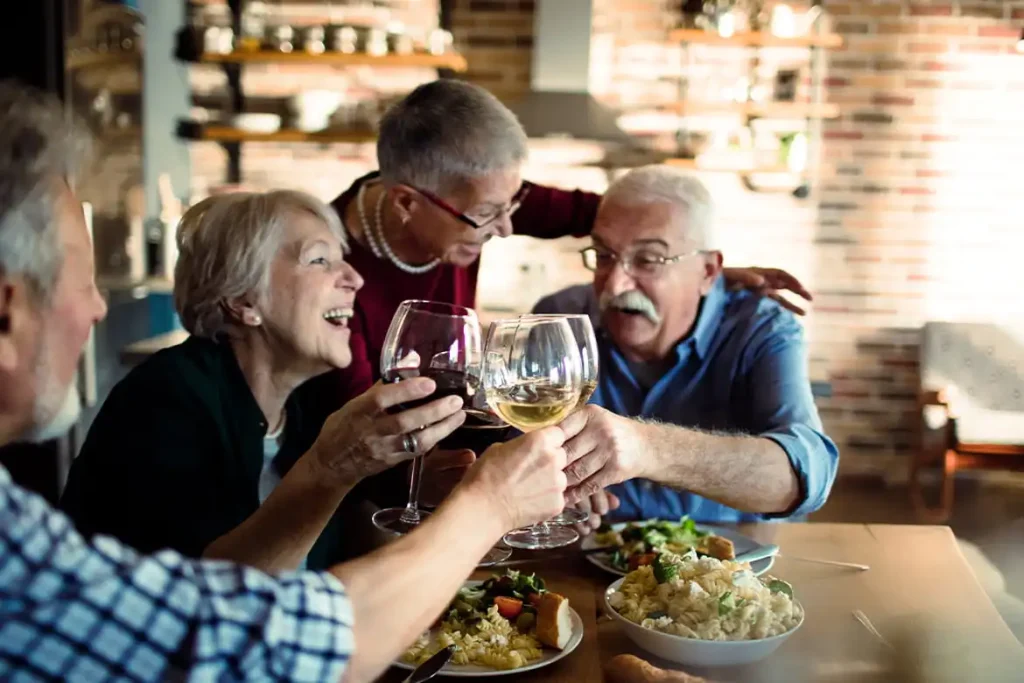
Nursing Home Alcohol Policy: Can Residents Drink Alcohol?
What is nursing home alcohol policy and what does it do? As people age, the negative effects of excessive alcohol consumption on brain functions such as memory, attention and learning increase. Research results show that elderly people who consumed alcohol excessively had very low scores on tests of cognitive functions such as learning skills, memory and speed of mental processing.
A long history of alcoholism was also associated with very poor learning ability, very low memory and motor performance. Even regardless of age, alcoholics showed a significant decrease in attention or executive functions such as working memory and reasoning power. The researchers noted that the use of alcohol is especially dangerous in the elderly, because other drugs are used at this age, and therefore there is a risk of drug interactions.
So, you understood to some extent what nursing home alcohol policy is for and why most nursing homes do not allow residents to consume alcohol? In this article from humanhealthmag, the problem of substance abuse in the elderly will be discussed. Aging causes changes in drug consumption patterns and creates certain problems in this field that are important from a social and health point of view.
Can Nursing Home Residents Drink Alcohol?
Nursing home alcohol policy; Although there are no special requirements or regulations in some nursing homes regarding the restriction of alcohol consumption, it is better to read these materials yourself and then make a decision.

Sometimes we hear that they say that certain types of alcoholic beverages are good for the body, and in most cases, they also say about its harm. But the issue that is more certain than any other issue is the side effects of alcohol consumption in the elderly. The undisputed truth about alcohol consumption among the elderly is that its harms far outweigh its unproven benefits. But sometimes its benefits are mentioned, which should be said that if it has benefits in some cases, this benefit is not true for all people.
You have to accept the truth, and it is nothing but the proven harm of alcohol to the body of the elderly. In the continuation of this article, we first intend to talk about the dangers of alcohol consumption for the elderly and then guide those who have elderly alcoholic parents to face this problem well.
Nursing Home Alcohol Policy: Complications of Alcohol Consumption in the Elderly
Nursing home alcohol policy; Maybe the benefits of alcohol for the body have not been proven yet, but its side effects are definite and clear. Risky and excessive consumption of alcohol refers to 3 times a day or more. For women, drinking alcohol more than 7 times a week is risky, and for men over 65, drinking more than 4 times a week is very risky. If people close to you are in this category, we need to deal with the side effects of this type of risky habit together.
- Some types of cancer such as breast cancer, oral cancer, pharynx cancer and liver cancer can be a side effect of alcohol consumption in the elderly.
- Pancreas
- If the user has a medical record related to cardiovascular disease, alcohol consumption can lead to his/her sudden death.
- The risk of heart attack can be a side effect of alcohol consumption.
- stroke
- Liver diseases
- High blood pressure
- Suicide (read important points related to elderly suicide prevention)

Nursing Home Alcohol Policy: What Should be Done When Faced with an Alcoholic Senior?
If you don’t drink alcohol yourself, never approach it. We suggest that you do not prepare and prescribe alcohol for the elderly in your facility due to its unproven and few benefits. Now, if you have an elderly alcoholic in your nursing home, it is better to treat him/her like this:
Nursing home alcohol policy; Talk to him/her. Many problems and issues can be solved by talking. Maybe if you are a good listener for someone who is addicted to alcohol, you can save him/her from the consequences of drinking it.
When you want to talking to an elderly person who is drinking about the effects of alcohol, remember to use the right words. For example, a person who is an alcoholic and needs help, using the word “alcoholic” during a loving conversation with him, not only does not make him feel better, but also leads him to consume more alcohol. Try to always be kind and patient. Keep a smile on your face and talk to him calmly so that he listens to you well.
Be careful what your words carry. Try to use the word “I” instead of “you” more. With this, an elderly person who consumes alcohol will not feel frustrated and blamed from your words. For example, say, “I feel sad when I see you drinking alcohol instead of spending time with your grandchildren and playing.”
Remember that they probably know they are doing something wrong. If you are not kind to them and instead make feel bad, you will never be able to help them with the effects of alcohol in the elderly. Be his supporter and say this. Tell him/her that you are with him/her in this way and that you will not hesitate to help him whenever you can.

What Should be Done When Faced with an Alcoholic Parent?
Sometimes you may have noticed that your elderly parent is addicted to alcohol. But he/she probably does not know about his/her own addiction to alcohol and the effects of alcohol on the elderly. In the best case, if he has noticed this habit, he/she is in a state of denial. You understand it and it is better to tell him so that he knows about his situation. For example, you can say, “I feel like we talk less on the phone lately, and when we do, you don’t pronounce the words correctly. Did something happen?”
Say, “I’m worried about you. Ever since mom died, you’ve been drinking regularly. I am also very sad that mother has passed away, but I don’t think that alcohol can take away this pain.”
Do not talk to the person when he/she is drinking alcohol. If you are going to talk to your elderly parent on the phone, and as soon as he/she picks up the phone you realize he/she is drunk, it is best to tell him/her that I will call you later. You probably know that talking in these situations is not easy at all. Either you both get nervous or you won’t understand each other’s words at all. Here you have to be patient and talk to him/her at the right time.
End your conversation with, “I’ll call you later. “I feel that now is not the right time to talk.” Or you could say, “I feel like you’ve been drinking. can we talk later? Call me whenever you are sober.” If they have a set time to drink alcohol, choose another time to talk to them. You can also use something like this: “I can tell from the way you walk and talk that you’re still drinking.
Concluding Remarks
In this article, we talked about nursing home alcohol policy. Again, we emphasize that instead of having a long conversation about the effects of alcohol in the elderly, use short conversations to let them know that you are concerned about them. If you tell them about your concern and you don’t see a proper reaction from them, it might be better to ask a professional therapist for help.
If any of your nursing home residents are reluctant to talk about it, it’s best not to talk to them about it for a while. It might be better to focus your conversation on keeping them healthy. If their denial bothers you so much, don’t insist on it anymore. Someone who is aware of the effects of alcohol on the elderly and cares about their own health will definitely ask for your help. But if he doesn’t want to change and leave his habit, then it’s better not to bother yourself. Remember that you should not suddenly cut off the access to alcohol to an elderly person who has a habit of consuming alcohol. This has worse consequences. What is your experience with this problem? Write to us.

FAQs
Can the elderly consume alcohol in a nursing home?
It varies depending on the policies of each nursing home. Some homes allow seniors to drink on a limited, supervised basis, while others prohibit alcohol altogether.
How does the nursing home ensure the safety and health of the residents when consuming alcohol?
Caregivers carefully monitor alcohol consumption and consult with physicians and families as needed to ensure that alcohol consumption does not interfere with medications and medical conditions.
What measures are taken in case of excessive alcohol consumption by nursing home residents?
If excessive alcohol consumption is observed, the staff immediately intervenes and takes the necessary measures to preserve resident’s health, including contacting the doctor and family.
